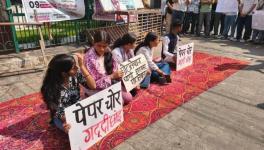500 Million People Do Not Have Access to Paid Work Worldwide: ILO Report
About half a billion people in the world do not have access to as many paid hours of work as they would want, according to a new report by International Labour Organization (ILO).
The report called World Employment and Social Outlook: Trends 2020 (WESO) also said that unemployment is expected to rise by about 2.5 million by 2020 – even as it has been stable for the past nine years. The reason cited to be behind this expected rise is the slowing global economic growth. As the global labour force increases, not enough new jobs are being generated to absorb new entrants to the labour market.
It should be noted that the International Monetray Fund (IMF) recently blamed India for the global economy slowdown and lowered India’s economic growth forecast to 4.8% for this fiscal year. It said, “The downward revision primarily reflects negative surprises to economic activity in a few emerging market economies, notably India, which led to a reassessment of growth prospects over the next two years.”
“For millions of ordinary people, it’s increasingly difficult to build better lives through work,” ILO Director General Guy Ryder was quoted as saying. “Persisting and substantial work-related inequalities and exclusion are preventing them from finding decent work and better futures. That’s an extremely serious finding that has profound and worrying implications for social cohesion.”
The WESO also stated that in addition to the global number of unemployed (188 million), 165 million people don’t have enough paid work and 120 million have either given up actively searching for work or otherwise lack access to the labour market. In total, more than 470 million people worldwide are affected.
“Labour underutilization and poor-quality jobs mean our economies and societies are missing out on the potential benefits of a huge pool of human talent,” said the report’s lead author, Stefan Kühn, according to ILO. “We will only find a sustainable, inclusive path of development if we tackle these kinds of labour market inequalities and gaps in access to decent work.”
Moderate or extreme working poverty is expected to edge up in 2020-21 in developing countries, increasing the obstacles to achieving Sustainable Development Goal 1 on eradicating poverty everywhere by 2030. Currently working poverty (defined as earning less than US$3.20 per day in purchasing power parity terms) affects more than 630 million workers, or one in five of the global working population, said ILO.
Other significant inequalities – defined by gender, age and geographic location – remain stubborn features of current labour markets, the report shows, limiting both individual opportunities and general economic growth. In particular, a staggering 267 million young people (aged 15-24) are not in employment, education or training, and many more endure substandard working conditions, it added.
Also read: India's 1% Richest Have 4-Times the Total Wealth of 70% Poorest: Oxfam
Get the latest reports & analysis with people's perspective on Protests, movements & deep analytical videos, discussions of the current affairs in your Telegram app. Subscribe to NewsClick's Telegram channel & get Real-Time updates on stories, as they get published on our website.























